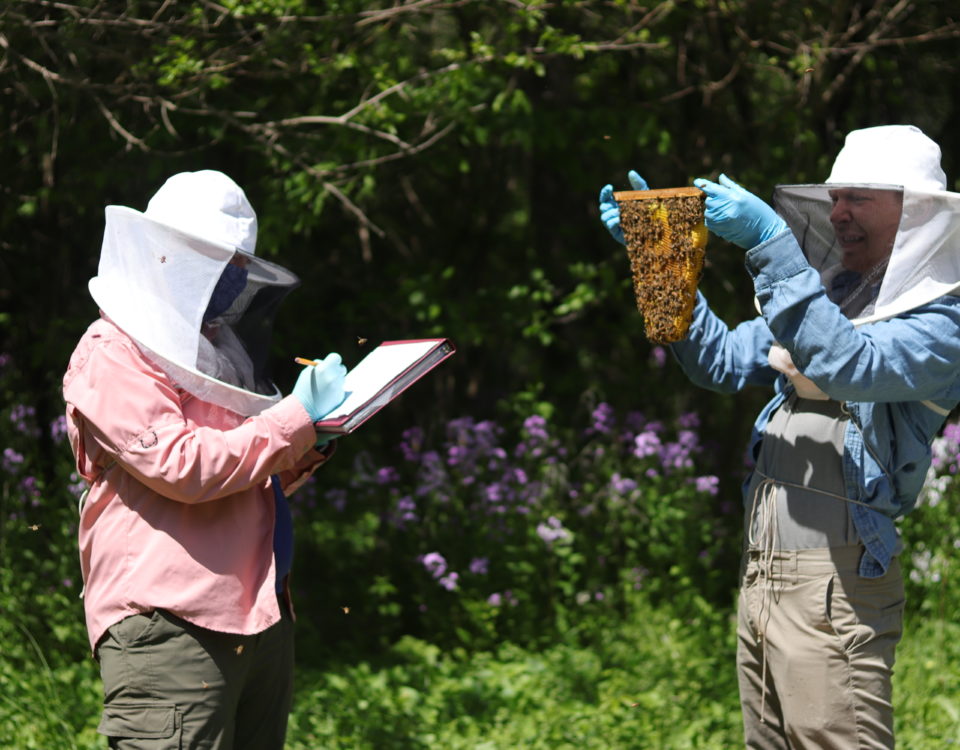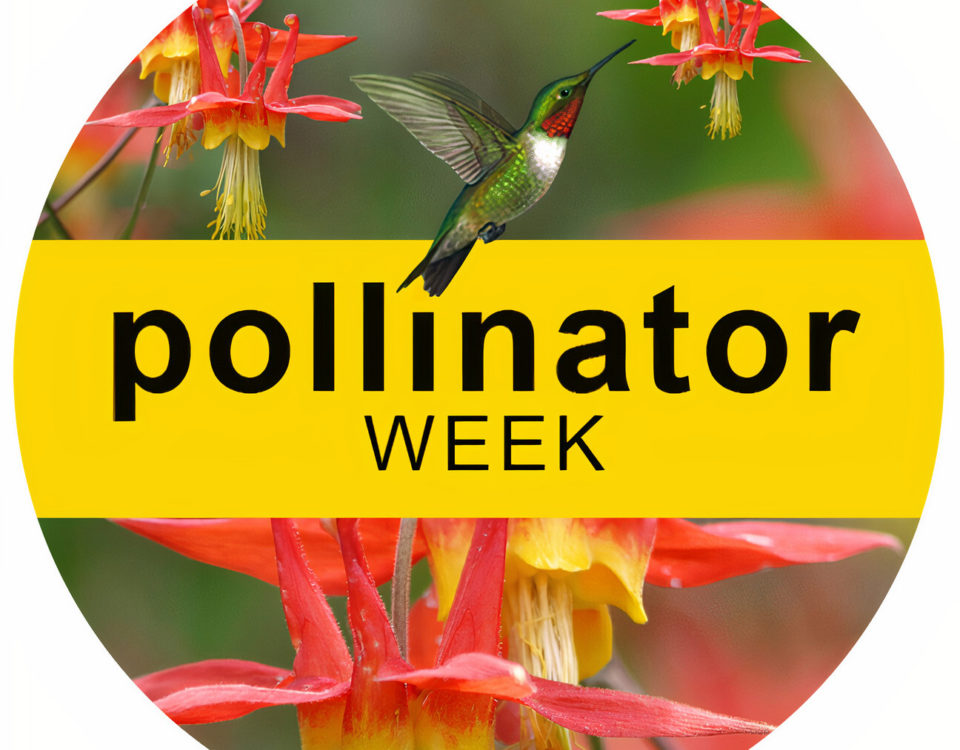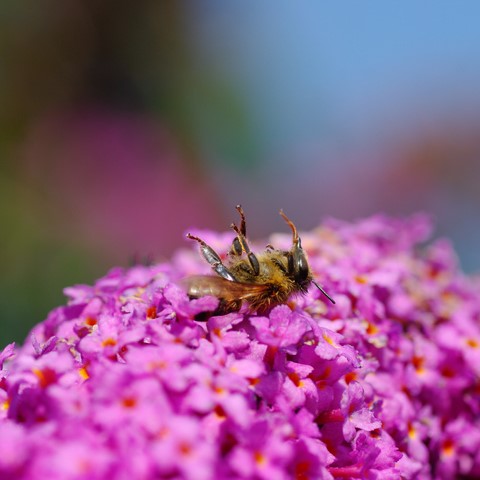- All-In-One Beekeeping for the Bees
- +1-608-728-8233
- info@beepods.com
#SnowUsYourBees 2018

Winterized Beepods protecting our bees from the harsh Wisconsin winter!
Why #SnowUsYourBees?

Winterized Beepods protecting our bees from the harsh Wisconsin winter!
Early last year, we made a post asking you to #snowusyourbees. It was such a hit that we though that we would bring it back, but with a few updates. We’re big fans of sharing updates because it allows us to see how our fellow beekeepers are doing, and it also gives new beekeepers an idea of how their winter hive compares to those of other beekeepers.
Winter is a tough time for both bees and beekeepers. The bees are trying to survive in harsh conditions, and their keepers are worried about them making it through the winter. Beekeepers are right to worry, as winter is the most common time for hive deaths to occur.
There are many reasons that hives are most vulnerable in the winter. As mentioned earlier, harsh weather conditions can cause your bees to freeze to death. They can also run out of food, which is almost always preventable (read more about this in our article about feeding your bees in the winter). Parasites are also a problem in the winter, since a honey bee hive is a nice warm environment, and other animals may trespass in order to get out of the cold.
These are just a few of the reasons we want to bring about more awareness of the challenges of overwintering bees. The majority of people aren’t beekeepers, and therefore don’t understand what bees do in the “offseason.” For those who are keeping bees, though, we want to share some creative ways that beekeepers of all skill levels are preparing their bees for the winter elements.
At Beepods, part of our philosophy is to prepare bees for every type of climate. Since this post is primarily about the winter months, it’s a good thing we’re located in Wisconsin – we have a lot of practice with helping bees get through harsh winters.
Over the years, we’ve been testing and developing strategies to get our bees through the winter. We’ve seen great results in our own bees and in those of other Beepods beekeepers. Our priority is to give honey bees the greatest chance of survival.

Figure 1: Summary of the total overwinter colony losses (October 1 – April 1) of managed honey bee colonies in the United States. The acceptable range is the average percentage of acceptable colony losses declared by the survey participants in each year of the survey.
Over the 2015/2016 year winter losses measured by the Bee Informed Partnership made up half of the annual loss. The significant winter losses contribute to stresses on the honey bee population. Beyond that, the attitude of beekeepers suffers with each unsuccessful winter. Over the 2015/2016 winter, 28.1% of surveyed honey bee colonies perished during the winter (read more here). This was up 5.8% from the previous year. A 2014/2015 year that was notably harsher than 2015/2016.
Over the 2016/2017 winter, 21.1% of colonies surveyed were lost. This is quite an improvement over the 2015/2016 winter losses of 28.1%. If this trend continues, losses will be even lower for the 2017/2018 winter!
What Does This Mean?
As beekeepers, we need to pay close attention to this information – at Beepods, we do. As stated earlier, we’ve tested many applications of winterizing equipment and practices that help to ensure higher overwintering success. During the 2014/2015 winter season, we had fairly good success, maintaining higher survival rates than most beekeepers in our areas. Our numbers over the 2015/2016 winter were phenomenal. Each of the colonies prepared in the fall with our sustainable preparation and then overwintered with the BEErito and winterizing kit made it through the winter. In the 2016/2017 season, our numbers were not so good. We lost about 86% of our hives, but that was because they were overwintered in nucleus hives, which are not meant for overwintering. Unfortunately, we were forced to overwinter our bees in nucleus hives, because we ended up with more colonies than we expected to, and did not have enough regular hives for them when it was time to prepare them for winter.
It is important to track losses and figure out what we’re doing right or wrong if we want to find a sustainable way to improve the abundance of honey bee colonies around the world. You can read more about some ways the Beepods Beekeeping Philosophy and Winterizing Here.
Sometimes, there are factors that beekeepers have no control over, like the genetics of their bees. There’s still a lot to learn about bee genetics, so the beekeeping world doesn’t have a firm grasp on what makes a bee better at surviving the winter. At this point, tracking your colony and paying attention to the attributes of our colonies, both dead and alive. Over time we may be able to detect common characteristics in colonies that survive versus colonies that die in the winter.
What Can You Do to Help?
Once again, we are asking you to:
- Take photos of their beehives/colonies during the winter and post them to your favorite social media.
- Use the hashtag #SnowUsYourBees
- We will share that out to our growing network (many of whom are NewBEEs or interested) to give them an idea of what to expect in winter.
- Every year we do this we want to hear how you are winterizing your colonies. Share, document and let us know what you are doing and if it is successful.
Why?
Data-driven development is important to the future of beekeeping. We want to share what is working over and over again so all beekeepers have successful overwintering. Every Beepods Beekeeping System Tool has gone through testing, data collection, breaking and iterations. We listen to what works and doesn’t work with our customers and clients and we tweak and test it. It is one of the best ways to build something better to save the bees.
Conclusion
If you have questions on how to get involved with us on this project, email us at info@beepods.com. Subject: #SnowUsYourBees. Let us know how you think you can help and let’s talk. I bet we come up with some great ideas to move the beekeeping world forward. After all, we all are working to BEE the change – why not work together on it?
Devon Rowley
Latest posts by Devon Rowley (see all)
- Why You Should Purchase the Beepods Online Course - May 16, 2018
- Hive Alive Review - March 16, 2018
- Nucleus Colony or Packaged Bees – Which is right for you? - March 13, 2018



